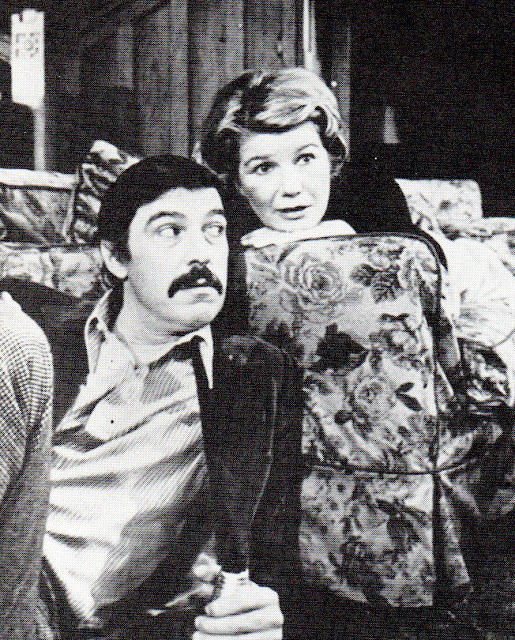 |
| Gene Rupert, Barbara Bel Geddes. |
FINISHING
TOUCHES [Comedy/Family/Marriage/Sex] A: Jean Kerr; D: Joseph
Anthony; S/L: Ben Edwards; C: Jane Greenwood; P: Robert Whitehead and Roger L.
Stevens; T: Plymouth Theatre; 2/8/73-7/1/73 (164)
 |
| Scott Firestone, Barbara Bel Geddes, Oliver Conant, Robert Lansing. |
A light comic treatment of the serious domestic
problem of midlife sexual crisis in the married lives of an apparently
well-matched pair, Finishing Touches skirted
the edges of its subject matter, mining it for laughs, and handled its
characters and plot predictably and with little depth. Yet Jean Kerr’s basic
sincerity, her polished dialogue, and clever wisecracks kept the action moving,
provided excellent material for a fine cast to work with, and her play was given a
well-directed and designed production in the best Broadway tradition.
 |
| Cast of Finishing Touches. |
Professor Jeff Cooper (Robert Lansing) and his wife,
Katy (Barbara Bel Geddes), a couple in their early 40s comfortably ensconced in
a large house in a New England college town, have been married for over 20
years. They have three sons, one of whom, Steve (James Woods), arrives with his
roommate, the young actress, Felicia Andrayson (Pamela Bellwood). Jeff is
anxiously awaiting news as to whether he’s been promoted to full professor.
 |
| Barbara Bel Geddes, Robert Lansing. |
Meanwhile, he reveals that he has a crush on a pretty
student, a disclosure that soon has Katy teetering on the brink of an affair
with an affectionate next-door neighbor, Fred Whitten (Gene Rupert). Neither
the professor nor his wife consummate their yearnings, the former even turning
down a tryst with his son’s girlfriend, to whom he’d turned his attention, and husband
and wife return to each other’s arms. The promotion, of course, now is safely in his
hands.
 |
| Pamela Bellwood, Barbara Bel Geddes, James Woods, Denise Galik. |
Jean Kerr’s warm and honest humor and her literate,
amusing characters brightened the otherwise fragile, though well-made, sitcom
plot. The play was old fashioned in manner, and its preference for the
established values. “Jean Kerr . . . ,” wrote Martin Gottfried, “has confronted
the modern sexual revolution and decided that it never happened.” TV sitcoms
had usurped whatever originality was in the form, and Kerr’s play did little to
avoid being labeled a superior example of the genre. “It amuses, it massages,
it conforms and it confirms,” said Clive Barnes.
 |
| Robert Lansing, Pamela Bellwood. |
One or two critics wrote predominantly negative
reviews, but most treated the play—by the wife of one their most respected
colleagues, Walter Kerr—as the harmless, time-passing exercise it was. Bel
Geddes’s performance as the quintessential Kerr heroine—enchanted most viewers,
but a few found her manner and tiresome. The remaining performances were
considered anywhere from delightful to competent.





